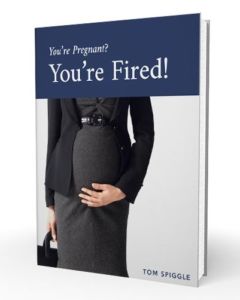 If you have been fired or suffered an adverse employment action like a demotion or pay cut because you are pregnant, your employer may have violated federal and state laws. Those laws prohibit employment discrimination on the basis of pregnancy and sex. These laws are meant to discourage employers from acting as if an employee is incapable of work simply because she is pregnant.
If you have been fired or suffered an adverse employment action like a demotion or pay cut because you are pregnant, your employer may have violated federal and state laws. Those laws prohibit employment discrimination on the basis of pregnancy and sex. These laws are meant to discourage employers from acting as if an employee is incapable of work simply because she is pregnant.
In a recent case, the federal Equal Employment Opportunity Commission (EEOC) sued the owners of a Tempe, Arizona bar, Moonshine Group, LLC, when it fired one of its bartenders, Michelle Viscusi, after learning she was pregnant. Moonshine Group operated Moonshine Whiskey Bar until July 2015, when it sold the bar to True Country Enterprises LLC, also based in Tempe. True Country was also a defendant in the lawsuit.
Viscusi filed a complaint with the EEOC. The agency investigated the case, found reasonable cause, and attempted to settle the case but failed. The EEOC later filed a lawsuit in the U.S. District Court for the District of Arizona. The lawsuit alleged violations of the federal Title VII of the Civil Rights Act of 1964, as amended by the Pregnancy Discrimination Act. Ultimately, the defendants agreed to settle the case for $66,000 and take other actions in response to the lawsuit, according to an EEOC press release. Here is what happened.
The Employer Opens Mouth and Inserts Foot in Recording
 Moonshine Group was served with the lawsuit but failed to appear or defend itself in court. Judge Douglas L. Rayes held a default judgment hearing, during which the EEOC provided a recording of a conversation between Viscusi and Benjamin Levine, one of Moonshine Group’s owners. Viscusi was four months pregnant at the time. On the recording, Levine tells her,
Moonshine Group was served with the lawsuit but failed to appear or defend itself in court. Judge Douglas L. Rayes held a default judgment hearing, during which the EEOC provided a recording of a conversation between Viscusi and Benjamin Levine, one of Moonshine Group’s owners. Viscusi was four months pregnant at the time. On the recording, Levine tells her,
There’s going to be a whole number of people that I would be offending by allowing a pregnant person to be behind the bar. They might look at it as the owner’s a f—ing idiot they’re letting a girl that’s pregnant that could get injured behind the bar bartending right now. How irresponsible are those guys?
In an April 19 order granting a default judgment to the EEOC, the judge found Moonshine’s conduct “deplorable” and found that the company violated federal law by removing Viscusi from her duties because she was pregnant. The judge ordered Moonshine Group to pay $15,721 in backpay, $925 in backpay interest, $10,000 in compensatory damages, and $15,000 in punitive damages, for a total of $41,647.
Under a separate decree, the court ordered True Country to pay $25,000, conduct management training, and implement new equal employment opportunity policies so that the company’s practices comply with antidiscrimination law.
Pregnancy Discrimination Act
The EEOC reported that it received 3,543 claims of pregnancy discrimination in fiscal year 2015, which was about 4% of the 89,385 charges the agency received that year.
The federal Pregnancy Discrimination Act makes employment discrimination based on pregnancy, childbirth, or related medical conditions unlawful under Title VII. That law covers employers with 15 or more employees, including state and local governments, employment agencies and labor organizations, and the federal government.
Women who are pregnant or who have pregnancy-related medical conditions must be treated in the same manner as other applicants or employees with similar abilities or limitations.
The law covers hiring, pregnancy and maternity leave, health insurance, fringe benefits, and retaliation.
1. Hiring
A potential employer cannot refuse to hire a pregnant woman because of her pregnancy; a pregnancy-related condition; or the prejudices of co-workers, clients, or customers.
2. Pregnancy and Maternity Leave
 Employers cannot single out pregnant workers for special procedures to determine whether they can work. If the employer requires employees to provide a statement by a doctor about their inability to work before providing leave or paying sick benefits, the employer may require the same from employees with pregnancy-related conditions.
Employers cannot single out pregnant workers for special procedures to determine whether they can work. If the employer requires employees to provide a statement by a doctor about their inability to work before providing leave or paying sick benefits, the employer may require the same from employees with pregnancy-related conditions.
If an employee temporarily cannot perform her job due to her pregnancy, the employer must treat her just as it would any other temporarily disabled employee.
Pregnant employees must be allowed to work as long as they can. If an employee missed work due to a pregnancy-related condition and recovers, the employer cannot force her to stay on leave until giving birth. There also cannot be a rule barring an employee from returning to work for a given length of time after childbirth.
Employers must hold jobs open for a pregnancy-related absence for the same length of time as they would for employees out on sick or disability leave.
3. Health Insurance
Health insurance companies must cover expenses for pregnancy-related conditions just as for other medical conditions. They must also reimburse pregnancy-related costs exactly as those incurred for other medical conditions. The same level of health benefits must be available for male or female spouses.
4. Fringe Benefits
Pregnancy-related benefits cannot be limited to married employees. If workers on leave receive benefits, they must be the same for pregnancy-related conditions as for any other condition. If a pregnant employee is on a temporary leave, she must be treated the same as others for accrual and crediting of seniority, vacation calculation, pay increases, and temporary disability benefits.
5. Retaliation
Like other civil rights laws, it is illegal to retaliate against an employee for opposing discriminatory employment practices based on pregnancy or for filing a discrimination charge, testifying, or participating in any way in an investigation, proceeding, or litigation under Title VII.
Summing It Up
Employers cannot discriminate against female employees because of their pregnancy under federal and state laws. Steps that employers cannot take because of pregnancy include the following:
- failing to hire pregnant employees;
- firing pregnant employees;
- forcing pregnant employees out on a leave of absence;
- singling pregnant employees out for criticism, harassment, demotion, or a cut in pay; or
- treating pregnant employees differently in terms of returning to work after a leave.
If you believe that you have been discriminated against because of your pregnancy, contact our office so we can talk about what is going on at work, why you think pregnancy is affecting your treatment, how the law may apply in your situation, and what your best options are for protecting your rights and interests.





